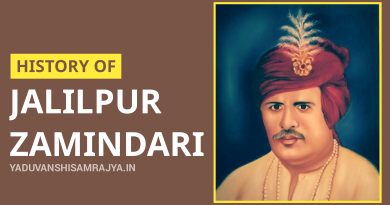Rash Bihari Lal Mandal
Babu Rash Bihari Lal Mandal (1866-1918) was a Zamindar of Madhepura and leader of Indian National Freedom Movement. He belonged to the Ahir zamindar family of Murho Estate. He wrote a book named ‘Bharat Mata Ka Sandesh’ during Bang-Bhang movement.

Early and Personal Life
Rash Bihari Lal Mandal was born in 1866 into the esteemed Ahir (Yadav) zamindar family of Murho Estate, in the Madhepura district of Bihar. Unfortunately, he lost his parents at a very young age, and he was raised by his maternal grandmother in Ranipatti. Rash Bihari Lal, despite his challenging circumstances, displayed a remarkable aptitude for learning. He pursued his education with great dedication and became proficient in several languages, including Hindi, Urdu, Maithili, Sanskrit, Persian, English, and even French.
Rash Bihari Lal took control of the zamindari estate of Murho at a young age, demonstrating his acumen and responsibility. He was married to Sitavati Mandal, they had three sons, Bhuvaneshwari Mandal, Kamleshwari Mandal and Bindheshwari Mandal.
Notable Contributions
- Role in the Indian National Congress:
Rash Bihari Lal Mandal was an active participant in the Indian National Congress. He played a pivotal role in the foundation of the Congress in Bihar and served as an elected member of the Bihar Provincial Congress Committee and the All India Congress Committee from 1908 to 1918. During the 1906 Congress session, He was among the leaders who fervently demanded for “Swaraj,” marking a crucial moment in the freedom struggle. He was associated with Congress leaders like Surendra Nath Banerjee, Bipin Chandra Pal, Satchidanand Sinha. In 1910, he represented Bihar as a delegate to the 25th Session of the Indian National Congress held in Allahabad.
- Protest Against British:
Rash Bihari Lal Mandal’s unyielding commitment to India’s independence led him to participate in various agitations against the British colonial rule. This bold stance resulted in over 120 cases filed against him by the British authorities. Despite his anti-British stance, Rash Bihari Lal was given a prestigious place at the Delhi Durbar during Emperor George V’s coronation in India in 1911.
The contemporary newspapers (including Amrit Bazar Patrika) published from Calcutta praised the indomitable courage and unprecedented boldness of Rasbihari Lal Mandal and wrote many articles and editorials.
- Contribution for Ahir caste:
In 1911, he founded the Gop Jatiya Mahasabha, which later merged with other regional organization of Ahir caste to form the All-India Yadav Mahasabha. Rash Bihari Lal even led a delegation of Ahirs before the Montague-Chelmford Committee in 1917, seeking proper representation for Ahirs in political reforms and the establishment of a separate regiment for Ahirs in the Indian army.
Members of AIYM also recognized and lauded his remarkable achievements and in 1936, the Yadav Patrika, under the editorial guidance of Rajit Singh, published an article in which the editor eloquently stated, “One Rash Bihari Lal made the entire Gop (Ahir) caste proud to a great extent.”
Philanthropy
Rash Bihari Lal Mandal’s commitment to his region was evident through his philanthropic endeavors. He generously donated large tract of land for the construction of a subdivisional headquarters and Post office in Madhepura, a gesture that contributed to local governance.
Honors
One of the most remarkable honors bestowed upon him was the title “Sher-E-Mithila” or “Mithila Ka Sher,” (meaning the Lion of Mithila) by the Maharaja of Darbhanga. The people of the Kosi region affectionately referred to him as “Yadav Raja.”
Death
Rash Bihari Lal Mandal passed away due to illness on August 26, 1918, in Banaras, at the age of 52. Remarkably, on the very next day after his death, his third son B.P. Mandal was born, who became the first Yadav Chief Minister of Bihar and was also the Chairman of the Second Backward Classes Commission, which is known as the Mandal Commission.


Pingback: Rai Bahadur Keshav Prasad Mandal - Yaduvanshi Samrajya